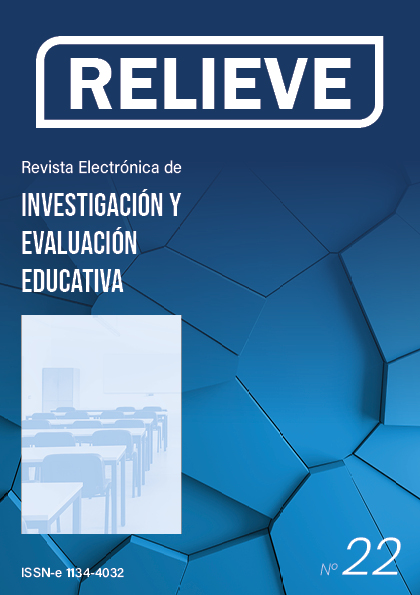Pensamiento reflexivo e investigador en Educación. Aspectos a tener en cuenta en la formación del profesorado
DOI:
https://doi.org/10.7203/relieve.22.2.8425Palabras clave:
educador reflexivo, profesorado investigador, formación de profesorado.Resumen
Formar al profesorado como profesionales reflexivos e investigadores debe ser una prioridad para un sistema educativo que busque la mejora de su alumnado en el manejo de información compleja y la resolución de problemas de forma creativa y divergente. El educador reflexivo, tal como es percibido por el profesorado español que participa en el estudio TALIS (OECD, 2014), ha sido distribuido en una escala o índice TRI que permite mostrar la frecuencia de participación en actividades formativas que facilitan un “Desarrollo profesional reflexivo” (DPR). La mitad de la muestra considera que su desarrollo profesional incluye actividades formativas ocasionales de carácter reflexivo. Se identifican, mediante análisis multinivel, los factores individuales y de centro asociados al perfil docente de educador reflexivo, que se corresponden con un atributo individual vinculado a una formación en red o de colaboración docente en torno a un centro con liderazgo pedagógico y control evaluativo. Esto supone para el docente una mayor dedicación e intensidad, una autopercepción de efectividad profesional y dominio sobre los procesos de enseñanza-aprendizaje que utiliza con su alumnado. El índice DPR se muestra consistente en la representación de un perfil docente que favorece la efectividad de los procesos de aula. Por la situación que presenta España en la estimación del índice DPR, consideramos de interés hacer evolucionar los modelos de formación inicial y continua del profesorado hacia un enfoque que potencie las capacidades reflexiva, investigadora y colaborativa de nuestro profesorado y estudiantes.
Descargas
Descargas
Publicado
Cómo citar
Número
Sección
Licencia
Los autores ceden de forma no exclusiva los derechos de explotación de los trabajos publicados a RELIEVE (a los solos efectos de favorecer la difusión de los artículos publicados:firmar contratos de difusión, de integración en bases de datos, etc.) y consienten que se distribuyan bajo la licencia de Creative Commons Reconocimiento-Uso No Comercial 4.0 International (CC-BY-NC 4.0), que permite a terceros el uso de lo publicado siempre que se mencione la autoría de la obra y la fuente de publicación, y se haga uso sin fines comerciales.
Los autores pueden llegar a otros acuerdos contractuales adicionales e independientes, para la distribución no exclusiva de la versión del trabajo publicado en esta revista (por ejemplo, incluyéndolo en un repositorio institucional o publicándolo en un libro), siempre y cuando se cite claramente que la fuente original de publicación es esta revista.
La mera remisión del artículo a RELIEVE supone la aceptación de estas condiciones.














